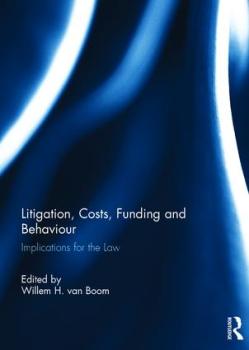Just out: my new book on ‘Litigation, Costs, Funding and Behaviour: Implications for the Law‘
This edited volume, with excellent contributions by acclaimed scholars, is devoted to the interplay between litigation costs, funding arrangements and the law. In litigation and other forms of dispute resolution, parties usually incur substantial costs. Apart from the time spent in court and the so-called ‘opportunity cost’ involved in litigation, civil proceedings give rise to attorney fees, expert and witness costs, court fees and disbursements. Some of these costs may be recouped, others may remain where they happen to fall. How does the exposure to cost risks affect litigation strategy? And to what extent does the opportunity to shift costs onto the adversary influence these strategies? Does the legal framework for litigation cost allocation (cost shifting rules) further influence the litigants’ behaviour? And how do private financing arrangement such as insurance and third party funding (TPF) fit into this picture? Do funders exercise specific powers over parties and their lawyers? Do they introduce certain dynamics to the proceedings which would otherwise not exist? And if so, is that bad? Should there be a legal framework in place to restrain these third parties or should this best be left to market forces?
In this volume ‘Litigation, Costs, Funding and Behaviour: Implications for the Law‘, experts from various jurisdictions confront these issues by presenting their legal, economic and policy-oriented perspectives on ‘Litigation, Costs, Funding and Behaviour: Implications for the Law’. Their contributions include topics such as cost shifting rules and the behavioural response they elicit; the insurance, financing, sale and commodification of claims; specific case studies in areas such as IP litigation, personal injury litigation, investment arbitration and class action litigation.
Let me briefly summarize the chapters:
- I contribute with a general chapter on litigation costs and third party funding which offers a comparative analysis of the issues, developments and regulatory choices concerning costs of litigation and funding arrangements. It also reflects on the behaviour of litigants and others involved and how the legal environment influences that behaviour.
- Jef De Mot, Michael Faure and Louis Visscher offer an economic analysis of third party funding and its alternatives.
- John Peysner reviews recent developments concerning the financing of access to justice in England and Wales.
- Charlotte Vrendenbarg explores ‘Legal Costs Awards and Access to Justice in Dutch Intellectual Property Cases’.
- Eric De Brabandere takes us into the domain of investment treaty arbitration, where he investigates the duty to disclose third-party funding involvement.
- Ben van Velthoven and Peter van Wijck test whether a recent Dutch legislative experiment allowing conditional quota pars litis (QPL) agreements between client and attorney in personal injury case is fit for purpose.
- Vicki Waye and Vince Morabito thoroughly analyse the development of litigation funding in Australian class actions.
- Astrid Stadler charts and discusses the response by the German legislature and judiciary to the involvement of funders in mass damages claims.
- Ilja Tillema deconstructs the often used argument that the involvement of litigation funding in collective damages actions encourages an unethical ‘compensation culture’ detrimental to society.
About the Book
This collection explores the practical operation of the law in the area of litigation costs and funding, and confronts the issue of how exposure to cost risks affects litigation strategy. It looks at the interaction of the relevant legal regime, regulatory framework and disciplinary rules with the behaviour of litigants, courts and legislatures, examining subjects such as cost rules and funding arrangements. The book discusses a wide range of topics such as cost-shifting rules, funding and mass tort litigation, cost rules and third-party funding (TPF) rules in specific areas such as intellectual property (IP) litigation, commercial arbitration, investment arbitration, the role of legal expense insurance arrangements, fee regulation and professional ethics. The contributors include renowned scholars, experts in their respective fields and well-versed individuals in both civil procedure and the practice of litigation, arbitration and finance. Together, they present a broad approach to the issues of costs, cost-shifting rules and third-party funding. This volume adds to the existent literature in combining topics in law and practice and presents an analysis of the most recent developments in this fast developing area.

